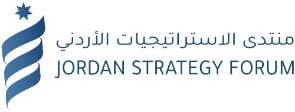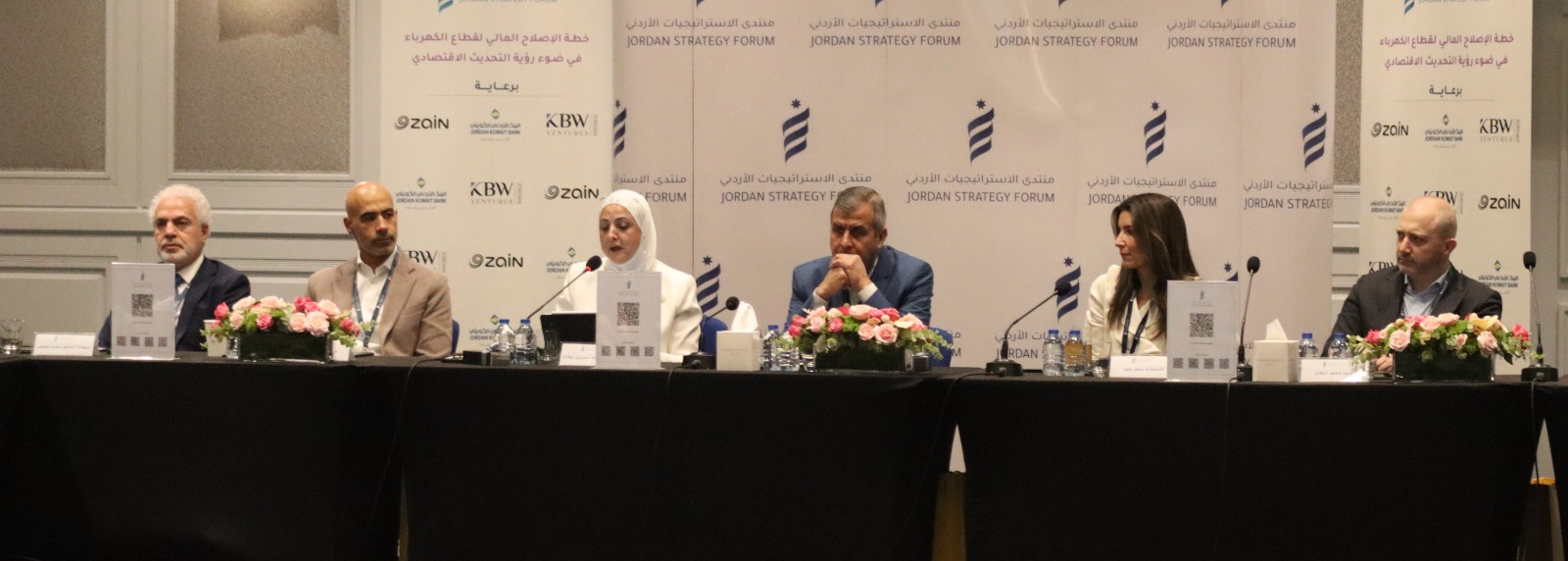Jordan Strategy Forum Holds a Discussion Session with the Minister of Energy and Mineral Resources
16-10-2024
The Minister of Energy and Mineral Resources, Dr. Saleh Al-Kharabsheh, emphasized the government's commitment to reforming the electricity sector in alignment with Jordan’s Economic Modernization Vision. Al-Kharabsheh outlined the government's aim to achieve financial balance within the sector, ensuring its sustainability and strengthening its role in driving the Kingdom’s economic development.
This was during a discussion session hosted by the Jordan Strategy Forum, to talk about the financial reform plan for the electricity sector in light of the Economic Modernization Vision. JSF's members from the private sector and experts in the field participated in the session. The event was sponsored by KbW Ventures, the Jordan Kuwait Bank, and Zain.
During his address, Al-Kharabsheh underscored that the energy sector in Jordan is progressing steadily and positively, noting the crucial role of investments in ensuring long-term sustainability. “Achieving reasonable financial returns from investments in the energy sector is key in maintaining its viability for future generations,” the minister stated.
Al-Kharabsheh also highlighted ongoing initiatives, such as the expansion of natural gas distribution to industrial zones and supporting the country's industrial sector. He revealed that new studies have identified copper ore deposits in areas beyond the Dana region, with several investment agreements soon to be signed in the mining sector.
The minister further elaborated on the country’s success in renewable energy, noting that 27% of Jordan's electricity is now generated from renewable sources. He highlighted the newly implemented renewable energy regulatory framework, which he described as “fair and reflective of successful international models.” Additionally, he emphasized Jordan's commitment to green energy through progress in legislation related to the national green hydrogen strategy.
Furthermore, he stated that the electricity storage project using hydroelectric power in the Mujib Dam will have a capacity of up to 450 megawatts. This project represents part of the government's efforts to improve Jordan's energy infrastructure and enhance its ability to meet the growing needs, he pointed out.
Nesreen Barakat, the CEO of the Jordan Strategy Forum, commended the energy sector as a key driver of economic growth and sustainable development in Jordan, directly influencing all productive and service sectors. She stressed that in the face of global energy challenges, enhancing energy security and sustainability through an integrated and flexible approach has become essential. "This requires innovative solutions that enable the energy sector to remain resilient and efficient amidst rapid economic and technological changes," she said.
Barakat highlighted that the Economic Modernization Vision prioritizes financial reform in the electricity sector to enhance its efficiency and sustainability. This includes improving financial performance, reducing financial burdens, and ensuring affordable energy for both citizens and investors. She added that reforms go beyond financial adjustments and include infrastructure development and the creation of a favorable investment environment for both conventional and renewable energy projects.
Barakat also emphasized the importance of good governance, transparency, and accountability in achieving these goals, all aligned with the broader objectives of the Economic Modernization Vision, which aims to boost the competitiveness of Jordan’s vital sectors and national economy.
The session concluded with an open dialogue, moderated by Samar Obaid, Board Member of the Jordan Strategy Forum and Partner at Ernst & Young. Participants discussed with Minister Al-Kharabsheh the challenges facing Jordan’s energy sector amid regional and global competition, strategies for improving efficiency and sustainability, critical role of public-private partnerships, and the importance of a robust legislative and regulatory framework to attract further investments.
Participants underscored the need for continued collaboration between all stakeholders to realize the ambitious goals set forth in the Economic Modernization Vision, which aims to enhance the competitiveness of the national economy and improve the quality of services for both citizens and businesses.
- Related to the news :
- Pictures


